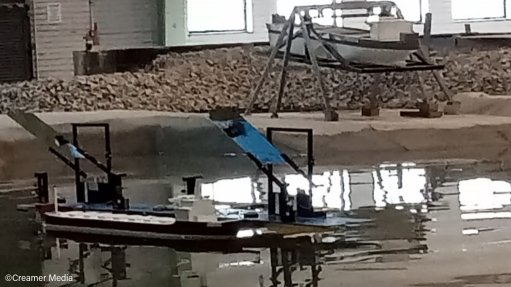How to advance African participation in the space industry
As the global space industry continues to expand, with new technological advancements and groundbreaking discoveries, it is crucial to address the question of how African countries, including South Africa, can encourage their citizens to enter the space field.
Speaking to Engineering News on the sidelines of the Forbes Woman Africa Leading Women Summit, which was convened on International Women’s Day, non-profit organisation (NPO) Deep Space Initiative executive director and founder Sara Sabry offered valuable insights into the challenges and potential solutions for fostering interest and participation in the space industry within the African context.
“One of the primary hurdles in promoting space exploration in African countries lies in the misconception that space and Earth are unrelated,” said Sabry, who is best known for becoming the first Egyptian person and the first Arab and African woman to travel into space. Her company Deep Space Initiative is aimed at expanding accessibility to space.
She emphasised the importance of effectively communicating the benefits of space activities to address this misconception and urged the need to understand the practical applications of space research on Earth, such as weather monitoring, satellite technology, and remote imaging. “By demonstrating the economic and societal benefits of space exploration, countries can encourage their citizens to invest more in this field,” she elaborated.
STEM Education
Meanwhile, while acknowledging the intimidating nature of certain science, technology, engineering and mathematics (STEM) subjects, such as nuclear propulsion and engineering, Sabry emphasised the significance of simplifying complex topics and adopting a systems engineering approach.
“Breaking down intricate subjects into manageable components allows individuals, including young women, to comprehend the interconnectedness of various elements before delving into the details,” she explained. She believes that fostering curiosity and eliminating gender stereotypes can empower young women to pursue STEM subjects.
In response to the underrepresentation of women in STEM fields, Sabry highlights the importance of dispelling stereotypes and promoting a supportive environment. She urged people to stop discouraging women from pursuing STEM careers and underlined the value of allowing individuals, irrespective of gender, to dream big and take risks.
“We need to challenge societal norms and encourage women to enter traditionally male-dominated fields,” she noted.
Creating Accessibility
Addressing the accessibility challenges in the space field, Sabry discussed the initiatives undertaken by Deep Space Initiative. The NPO focuses on increasing access to space-related opportunities globally, irrespective of nationality or resources.
“By providing research and educational opportunities, our organisation aims to level the playing field and create pathways for individuals interested in space exploration,” she explained.
Sabry's insights shed light on the multifaceted challenges hindering African participation in the space industry. By emphasising effective communication, breaking down complexity in STEM education, encouraging women in STEM, and creating accessibility, African countries can pave the way for a more inclusive and vibrant space sector.
“Through enterprises like Deep Space Initiative, the dream of expanding Africa's footprint in the cosmos becomes not only feasible but promising for the future,” she concluded.
Comments
Announcements
What's On
Subscribe to improve your user experience...
Option 1 (equivalent of R125 a month):
Receive a weekly copy of Creamer Media's Engineering News & Mining Weekly magazine
(print copy for those in South Africa and e-magazine for those outside of South Africa)
Receive daily email newsletters
Access to full search results
Access archive of magazine back copies
Access to Projects in Progress
Access to ONE Research Report of your choice in PDF format
Option 2 (equivalent of R375 a month):
All benefits from Option 1
PLUS
Access to Creamer Media's Research Channel Africa for ALL Research Reports, in PDF format, on various industrial and mining sectors
including Electricity; Water; Energy Transition; Hydrogen; Roads, Rail and Ports; Coal; Gold; Platinum; Battery Metals; etc.
Already a subscriber?
Forgotten your password?
Receive weekly copy of Creamer Media's Engineering News & Mining Weekly magazine (print copy for those in South Africa and e-magazine for those outside of South Africa)
➕
Recieve daily email newsletters
➕
Access to full search results
➕
Access archive of magazine back copies
➕
Access to Projects in Progress
➕
Access to ONE Research Report of your choice in PDF format
RESEARCH CHANNEL AFRICA
R4500 (equivalent of R375 a month)
SUBSCRIBEAll benefits from Option 1
➕
Access to Creamer Media's Research Channel Africa for ALL Research Reports on various industrial and mining sectors, in PDF format, including on:
Electricity
➕
Water
➕
Energy Transition
➕
Hydrogen
➕
Roads, Rail and Ports
➕
Coal
➕
Gold
➕
Platinum
➕
Battery Metals
➕
etc.
Receive all benefits from Option 1 or Option 2 delivered to numerous people at your company
➕
Multiple User names and Passwords for simultaneous log-ins
➕
Intranet integration access to all in your organisation





















